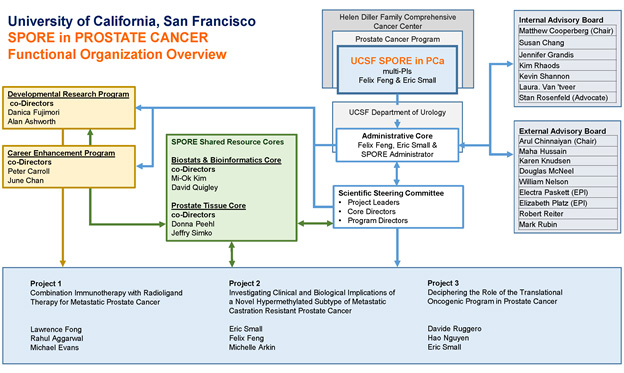UCSF Specialized Programs of Research Excellence (SPOREs) in Prostate Cancer
University of San Francisco
Principal Investigator(s):

Felix Feng, MD

Eric Small, MD
- Principal Investigator(s) Contact Information
- Overview
- Project 1: Combination Immunotherapy with Radioligand Therapy for Metastatic Prostate Cancer
- Project 2: Investigating Clinical and Biological Implications of a Novel Hypermethylated Subtype of mCRPC
- Project 3: Deciphering the Role of the Translational Oncogenic Program in Prostate Cancer
- Administrative Core
- Prostate Tissue Core
- Biostatistics and Bioinformatics Core
- Developmental Research Program
- Career Enhancement Program
- Institution SPORE Website
Principal Investigator(s) Contact Information
Felix Feng, MD
Professor of Radiation Oncology, Urology, and Medicine
George & Judy Marcus Distinguished Professor
Vice Chair for Translational Research, Dept of Radiation Oncology
Director, Benioff Initiative
1450 3rd Street, HD383 San Francisco, California, 94158
(415) 476-3802
Eric Small, MD
Professor of Medicine and Urology
Deputy Director and Chief Scientific Officer
UCSF Helen Diller Family Comprehensive Cancer Center
University of California, San Francsico
1450 3rd Street, HD279 San Francisco, California, 94158
(415) 353-7095
Overview
Prostate cancer is the second leading cause of cancer deaths of men in the United States and places a significant health burden on society. The overarching goal of the UCSF Prostate Cancer SPORE is to address this burden by reducing the morbidity and mortality associated with prostate cancer, through leveraging a deep understanding of the disease to translate biological findings into clinical impact. The SPORE team will approach this mission with transdisciplinary research that is highly collaborative and translational, through four specific aims: 1) Investigate molecular drivers of aggressive prostate cancer; 2) Develop biomarkers to guide treatment of patients with advanced prostate cancer; 3) Target therapeutic resistance in metastatic castration resistant prostate cancer (mCRPC), which is the lethal manifestation of advanced disease; and 4) Accelerate translational research across the spectrum of prostate cancer.
To address these aims, the UCSF Prostate SPORE proposes three scientific projects, each investigating aggressive prostate cancer from a mechanistic, biomarker, and therapeutic perspective:
Project 1: Combination immunotherapy with radioligand therapy for metastatic prostate cancer
Project 2: Investigating Clinical and Biological Implications of a Novel Hypermethylated Subtype of mCRPC
Project 3: Deciphering the Role of the Translational Oncogenic Program in Prostate Cancer
These proposed studies will be aided by horizontal collaborations with other Prostate SPORES, NCI initiatives, and molecular diagnostics companies, as well as vertical collaborations with the National Clinical Trials Network (NCTN), DOD Prostate Cancer Clinical Trials Consortium (PCCTC), and pharmaceutical companies, among other organizations. Additionally, these projects will be complemented by strong, ongoing institutional commitments of money and space, well-resourced Career Enhancement and Developmental Research Programs, and three cores: Administration, Biostatistics/Bioinformatics, and Pathology/Tissue.
The infrastructure outlined under this SPORE application is designed to encourage and promote translation of innovative, impactful ideas by supporting promising new projects, providing access to critical resources for bench-to-bedside transitions, sponsoring interdisciplinary collaborations, and providing an effective framework for mentoring/nurturing the next generation of translational scientists. By bringing together a diverse and multi-disciplinary group of investigators, this Prostate Cancer SPORE will accelerate highly impactful translational research with the potential to significantly improve clinical outcomes for men with aggressive prostate cancer.
Project 1: Combination Immunotherapy with Radioligand Therapy for Metastatic Prostate Cancer
Project Co-Leaders:
Rahul Aggarwal, MD (UCSF) Clinical co-Leader
Michael Evans, PhD (UCSF) Basic co-Leader
Lawrence Fong, MD (Fred Hutchinson) Applied co-Leader
Aim 1: Dissect the intra-tumoral and circulating immune cell states induced with 177Lu-PSMA-617 + anti-PD-1 in prostate cancer patients.
Aim 2: Determine whether PSA response-adaptive dosing of 177Lu-PSMA-617 can improve clinical and immunologic efficacy of the combination treatment in prostate cancer patients.
Aim 3: Define the immunologic response of external beam vs. beta-particle vs. alpha-particle emitting radioligand therapy in pre-clinical models.
Dissecting immune cell states induced with radioligand therapy will enable the rationale development of future treatment combinations as well as biomarkers for patient selection to realize improved clinical efficacy. Furthermore, determining the optimal form of radiation therapy to modulate immune responses will also help guide the field in improving approaches that combine radiation therapy with immune checkpoint inhibitors.
Project 2: Investigating Clinical and Biological Implications of a Novel Hypermethylated Subtype of mCRPC
Project Co-Leaders:
Eric Small, MD (UCSF) Clinical co-Leader
Michelle Arkin, PhD (UCSF) Basic co-Leader
Felix Feng, MD (UCSF) Applied co-Leader
Aim 1: To investigate how the CpG methylator phenotype promotes disease progression.
Aim 2: To identify clinically relevant therapeutic approaches for the CpG methylator phenotype mCRPC patient subset.
Aim 3: To develop and evaluate non-invasive clinical methylation biomarkers of CpG methylator phenotype status.
We have identified a novel mCRPC hypermethylated CpG methylator phenotype subtype through deep WGBS. The proposed studies will define the clinical relevance of this relatively common subtype and identify therapeutic approaches by investigating this phenotype from a mechanistic, biomarker, and therapeutic perspective.
Project 3: Deciphering the Role of the Translational Oncogenic Program in Prostate Cancer
Project Co-Leaders:
Eric Small, MD (UCSF) Clinical co-Leader
Davide Ruggero, PhD (UCSF) Basic co-Leader *
Hao Nguyen, MD, PhD (UCSF) Applied co-Leader
*Contact Project Leader
Aim 1: To target the eIF4E-dependent translational oncogenic program in a pre-clinical mCRPC model.
Aim 2: To undertake a clinical trial to examine the effects of tomivosertib in combination with enzalutamide in patients with mCRPC
Aim 3: To characterize novel eIF4E interacting partners in PCa that may modulate eIF4E-dependent therapies.
We hypothesize that through the upregulation of eIF4E, prostate cancer cells rely on, and are addicted to, a rapid translation of a network of oncogenic mRNAs (including AR and its splice variant AR-V7), which control the translation of distinct mRNAs essential for regulating key hallmarks of human PCa. This translation rewiring represents a new point of vulnerability for mCRPC. We are in a unique position to understand the mechanisms of “translation addiction” in PCa and target this addiction with novel and highly specific compounds.
Administrative Core
Core Directors:
Felix Feng, MD (UCSF)
Eric Small, MD (UCSF)
The overall objective of the Administrative Core is to manage all administrative, financial, and operational needs of the UCSF Prostate Cancer SPORE by providing a strong organizational infrastructure and establishing and managing workflows and standard operating procedures within and between all elements of the SPORE. The Administrative Core will achieve these objectives through coordination of the following components:
- Leadership
- Administrative Management
- Integration of the SPORE within UCSF, HDFCCC, and the broader UCSF research community
- Cancer Patient Population
- Data Management
- Planning and Evaluation Activities

Prostate Tissue Core
Core Directors:
Jeffry Simko, MD, PhD (UCSF)
Donna Peehl, PhD (UCSF)
The Prostate Tissue Core (PTC) provides tissue and pathology resources to support the development and successful completion of research projects involving human tissue. In addition to tissue collection, the PTC monitors and characterizes cell line and pre-clinical model collections; performs pathology and support services, and provides specimen data to the Biostatistics & Bioinformatics Core for analysis and integration with other datasets. These responsibilities are summarized in the following four specific aims:
Aim 1: collect, process and store high quality biospecimens linked to clinical outcomes;
Aim 2: distribute these biospecimens to approved investigators;
Aim 3: provide a suite of consultative, histopathology, laboratory services, preclinical model development, and characterization services;
Aim 4: seek out collaborations and new sources of valuable biospecimens.
These aims are accomplished by the efforts of a dedicated team of pathologists, researchers, biostatisticians, lab technologists, and clinical research coordinators, along with the medical oncologists and urologists that recruit patient volunteers to participate in these activities. At project completion, the mCRPC collection of biopsies with matching blood and outcome data from at least 850 patients will represent one of the largest collections of such material in the world.
Biostatistics and Bioinformatics Core
Core Directors:
Mi-Ok Kim, PhD (UCSF)
David Quigley, PhD (UCSF)
The Biostatistics and Bioinformatics Core collaborates with SPORE investigators and scientists to ensure that research undertaken is rigorous, reproducible and of the highest quality. The Core personnel have expertise in relevant areas of Biostatistics and Bioinformatics that are required for the success of the SPORE projects. Support will be provided in all stages of research, beginning with the formulation of the research question, through the experimental design and data collection, including genomic sequencing, data analysis, and interpretation, to reporting and dissemination of results. In addition, faculty statisticians will also focus on tailoring cutting-edge biostatistics, genomic, and bioinformatics approaches to the needs of this SPORE, producing the highest quality of prostate cancer research, through the following aims:
Aim 1: Provide biostatistics and bioinformatics expertise in the design and conduct of clinical, laboratory, and high-throughput genomic sequencing experiments;
Aim 2: Assist investigators in the processing and examination of high-throughput genomic datasets, and the analysis, interpretation and reporting of clinical, laboratory and genomics data;
Aim 3: Provide biostatistics and bioinformatics support for the general governance of this application including assistance to the SPORE Career Enhancement and Developmental Research Programs.
Developmental Research Program
Program Directors:
Alan Ashworth, PhD (UCSF)
Danica Fujimori, PhD (UCSF)
The Developmental Research Program (DRP) in the Prostate Cancer SPORE encourages the development of highly innovative research in prostate cancer. The DRP will identify and fund exceptional projects with translational potential, and act as an incubator for novel projects that might not be funded under other mechanisms because of their high-risk potential. The DRP Directors will encourage proposal investigators to develop collaborations across the Prostate Cancer Program, potentially with SPORE Project investigators, and across UCSF’s full range of health science disciplines.
Career Enhancement Program
Program Directors:
Peter Carroll, MD (UCSF)
June Chan, ScD (UCSF)
The Career Enhancement Program (CEP) Prostate Cancer SPORE was developed to ensure a pipeline of exceptional prostate cancer translational research investigators. The CEP will 1) identify, recruit, and support new talent in prostate cancer translational research, represented both in early career stage faculty and in more established faculty who are new to prostate cancer research, 2) provide mentorship, particularly to early career stage investigators, and 3) coordinate and leverage programmatic and institutional resources to maximize the impact of CEP funding.
Institution SPORE Website:
Prostate Cancer Program/UCSF Helen Diller Family Comprehensive Cancer Center







